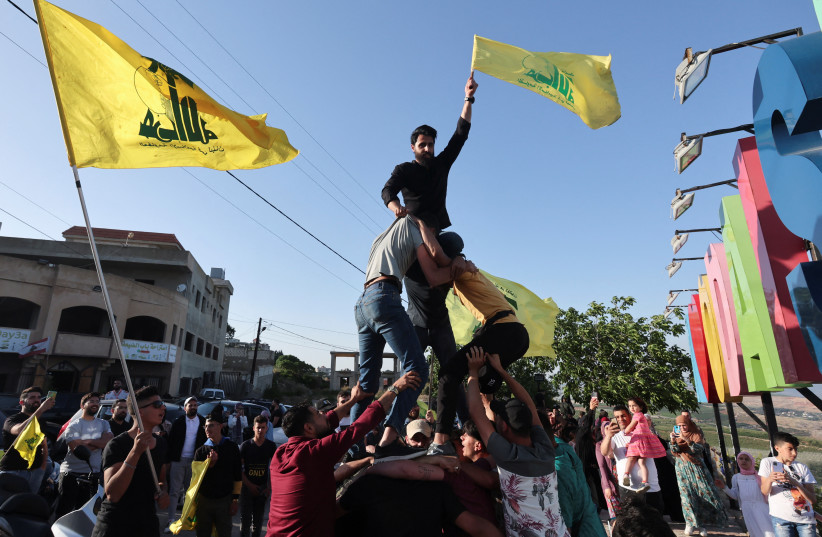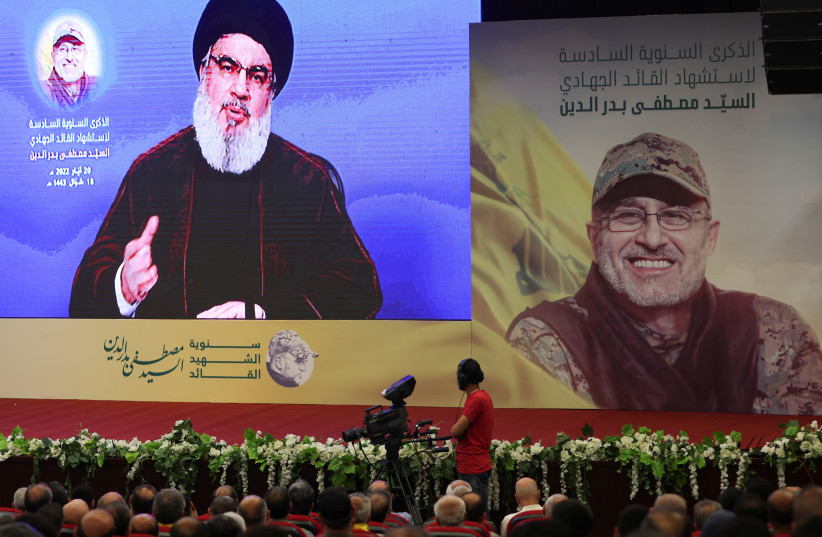by Debbie Mohnblatt
Experts say any large operation against Israel would require a green light from Tehran, which is unlikely to be given for now.
 |
Supporters of Lebanon's Hezbollah leader Sayyed Hassan Nasrallah,
gather as they carry flags, marking the commemoration of Israel's
withdrawal from southern Lebanon in 2000, in Adaisseh village near the
border with Israel, southern Lebanon, May 25, 2022.
(photo credit: REUTERS/AZIZ TAHER)
|
Hezbollah leader Hassan Nasrallah threatened an escalation of hostilities with Israel if the maritime border negotiations between Israel and Lebanon do not meet Lebanese demands.
"Whether a nuclear deal with Iran is signed or not, if the US mediator does not give Lebanon what it asked for in terms of its rights, we are heading toward an escalation — we are heading toward a problem," Nasrallah said in a televised address on Friday, adding that the US State Department mediating team led by Amos Hochstein is "still wasting time" which is "running out."
"Whether a nuclear deal with Iran is signed or not, if the US mediator does not give Lebanon what it asked for in terms of its rights, we are heading toward an escalation — we are heading toward a problem."
Hezbollah leader Hassan Nasrallah
However, Israeli and Lebanese analysts are unconvinced that an escalation by Hezbollah is a real possibility right now.
What is the Israeli-Lebanese maritime dispute?

Israel and Lebanon have had a years-long, ongoing dispute on who has the rights to the maritime territories that contain natural gas fields in which the two sides have yet to agree on a border. The latest round of indirect negotiations has been held with the mediation of a US delegation led by US Special Envoy and Coordinator for International Energy Affairs Amos Hochstein, with no results yet.
Brig.-Gen. (res.) Amir Avivi, founder and CEO of the Israel Defense and Security Forum, told The Media Line that Israel is seeing Hezbollah taking a more aggressive stance and, through that, trying to coerce Israel into giving up crucial economic interests in the negotiations, specifically gas fields in the maritime territory.
However, he believes that Hezbollah's threats are not made to be executed.
"They are threatening a lot but they are also not so eager to confront Israel," he said adding that a large operation against Israel could mean the destruction of the terror organization.
Hezbollah's decision to carry out an attack is much more complicated than Hamas', for example, he says. Hezbollah is part of the Lebanese government and to a large extent controls it; but it also has very strong opposition in many factions in Lebanon who see the Iranian proxy as responsible for the economic crisis and the collapse of the country, said Avivi.
Therefore, when Hezbollah thinks about confronting Israel, "it understands that it may face an existential threat," he said.
"It is not by chance that for so many years Hezbollah hasn't moved forward with a large operation against Israel. This would have devastating implications for this organization, and I think they know it," he continued.
"It is not by chance that for so many years Hezbollah hasn't moved forward with a large operation against Israel. This would have devastating implications for this organization, and I think they know it."
Brig.-Gen. (res.) Amir Avivi
What is the Lebanese perspective?
Imad Salamey, associate professor of political science and international affairs at the Lebanese American University in Beirut, adds that the decision to escalate hostilities between Hezbollah and Israel is not Nasrallah's to make.
"Nasrallah cannot escalate on his own without a green light coming from Teheran," he told The Media Line.
Avivi explains that as much as the Iranians want to threaten Israel though Hezbollah, they also want to keep its power intact for a possible future scenario of an Israeli attack on Iranian nuclear facilities.
Hezbollah's current power of over 100,000 missiles and mortars, according to Avivi, is one of the main ways that Iran has in order to try and deter Israel. "Wasting this now won't necessarily be wise from their [Iran's] perspective."
Dr. Omer Dostri, a military strategy and national security expert, and a researcher at the Jerusalem Institute for Strategy and Security, believes that one scenario in which Hezbollah could launch an attack is if Israel starts drilling gas from the Karish platform as planned for September, with no agreement yet signed with Lebanon.
The Karish gas drilling platform lies in disputed territorial waters between Israel and Lebanon. Israel says that the gas field is inside its United Nations-recognized exclusive economic zone, while Lebanon claims rights to those territorial waters on the second map it proposed during negotiations on the maritime border.
Dostri believes that if Hezbollah escalates its violence against Israel, it would be with a limited attack.
Avivi says that Israel must not surrender to the threats and must continue the talks through the American mediator to find an acceptable solution. He says Israel should "be ready to deal with Hezbollah if needed, while completely disregarding the threats and not letting them affect our judgment," Avivi said.
According to Dostri, Hezbollah possesses approximately 45,000 short-range rockets that can travel distances of up to 40 km, not including mortar bombs, in addition to approximately 80,000 medium- and long-range rockets, dozens of which are accurate.
What is Hezbollah's weapons arsenal?
"According to current IDF estimates, approximately 1,500 rockets will be launched each day of fighting on average from the territory of Lebanon," he said.
In addition, he added, Hezbollah is expected to use the Radwan Unit, which is a special ground maneuver force, whose mission has included penetrating Israeli territory through terrorist tunnels, and attempts to take over Israeli settlements, kill civilians, kidnap soldiers and disrupt supply lines or movement of IDF forces.
Hezbollah also owns a fleet of unmanned aerial vehicles and explosive drones. On top of that, Hezbollah is expected to use advanced anti-tank and anti-ship missile launch systems, he said.
Hezbollah is the most serious fundamental threat to Israel in the Middle East, Dostri says, and Israel has taken some steps as preparation to counter any escalation with Hezbollah.
The IDF has already increased the defense systems around the Karish gas rig, including the placement of special sensors that will warn against hostile actions.
It is likely that in preparation for the start of gas production in September, there will be a situational assessment in the Israeli security apparatus which will consider whether to increase the level of alertness in the northern arena, he added.
Additionally, in recent years the IDF has conducted a series of extensive military exercises and training simulating an escalation in the north and the possibility of a war with Hezbollah, and even a multi-front war against other terrorist organizations, according to Dostri.
Avivi added that this is the main field of operation for which the IDF has been preparing itself for many years.
Part of this process, he continued, is the destruction of the tunnels that Hezbollah built in order to attack Israeli communities along the northern border.
Salamey, believes that Hezbollah does not really intend to escalate hostilities, and that Nasrallah's threats have a goal of their own.
"What we are hearing is only threats to place more pressure on the Israeli side to hear some of the Lebanese demands which eventually Hezbollah can claim as an achievement or a victory," he said adding that "Hezbollah wants to sell the public the idea that its threats to Israel will really lead to the eventual agreement."
"Hezbollah wants to sell the public the idea that its threats to Israel will really lead to the eventual agreement."
Imad Salamey, associate professor of political science and international affairs at the Lebanese American University in Beirut
Debbie Mohnblatt
Source: https://www.jpost.com/middle-east/article-715229
No comments:
Post a Comment